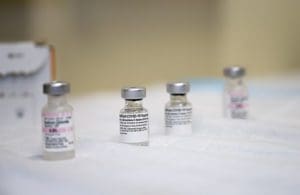
Doses of the COVID-19 vaccine at Walter Reed National Military Medical Center, Bethesda, Md. DoD photo by Lisa Ferdinando.
Despite the rare risk of myocarditis in children, the benefits of the Pfizer-BioNTech BNT162b2 vaccine likely outweigh the risks, according to a recent JAMA Cardiology report.
A separate pre-print study found that adolescents’ risk of contracting myocarditis is substantially higher after contracting COVID-19 than from receiving mRNA vaccines targeting the novel coronavirus. An earlier JAMA Cardiology article reached similar conclusions, reporting that “as many 1% of highly fit athletes with mild COVID-19 infection have evidence of myocarditis on [cardiac] MRI.”
A separate study in Circulation estimated that between 12–20% of hospitalized COVID-19 patients develop myocarditis.
The recent JAMA report did, however, suggest that the second dose of the BNT162b2 vaccine is more likely to lead to myocarditis than the first dose in individuals aged 12 to 17.
Drawing on 15 cases of myocarditis requiring hospitalization, the study found that the condition developed within one to five days after receipt of the BNT162b2 vaccine. All but one of the patients were male. Additionally, all of the patients had elevated cardiac troponins, which are a marker of myocardial injury. While patients’ levels of troponins decreased, they remained elevated.
All of the patients but one had a normal echocardiogram on follow-up ranging from one to 13 days after discharge. None of the patients required intensive care unit care.
The report authors, however, note that it is unclear whether post-vaccination myocarditis will be associated with long-term sequelae. Therefore, they conclude that more studies will be required.
A Pfizer spokesperson notes that the company is “aware of rare reports of myocarditis and pericarditis, predominantly in male adolescents and young adults, after mRNA COVID-19 vaccination.” Noting that CDC considers the side effect to be “extremely rare,” the spokesperson said “only an exceedingly small number of people will experience it after vaccination.”
“Patients have typically rapidly improved with conservative treatment,” the Pfizer spokesperson added. “It is important to note that CDC continues to strongly encourage COVID-19 vaccinations for eligible individuals aged 12 and older. With hundreds of millions of doses of the Pfizer-BioNTech COVID-19 vaccine administered globally, the benefit risk profile of our vaccine remains positive.”
Given the potential for heart inflammation, FDA has asked Pfizer, BioNTech and Moderna to expand the number of patients enrolled in COVID-19 vaccine clinical trials for school-aged children.
FDA has also added a warning of myocarditis to the label for the Pfizer-BioNTech and Moderna vaccines.